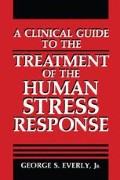Abstract
There has been skepticism that emotions aroused in a social context can so seriously affect the body as to lead to long-term disease or death. But the work, such as that of Wolf, shows that machinery of the human body is very much at the disposal of the higher centers of the brain.... Given the right circumstances, these higher controls can drive it mercilessly, often without awareness on the part of the individual of how close he is to the fine edge. (Henry & Stephens, 1977, p. 11)
I’m at the mercy of any rogue who cares to annoy and tease me.
—John Hunter, 18th-century physician
Access this chapter
Tax calculation will be finalised at checkout
Purchases are for personal use only
Preview
Unable to display preview. Download preview PDF.
Author information
Authors and Affiliations
Rights and permissions
Copyright information
© 1989 Plenum Press, New York
About this chapter
Cite this chapter
Everly, G.S. (1989). Stress-Related Disease: A Review. In: A Clinical Guide to the Treatment of the Human Stress Response. The Plenum Series on Stress and Coping. Springer, Boston, MA. https://doi.org/10.1007/978-1-4613-0741-9_4
Download citation
DOI: https://doi.org/10.1007/978-1-4613-0741-9_4
Publisher Name: Springer, Boston, MA
Print ISBN: 978-1-4612-8059-0
Online ISBN: 978-1-4613-0741-9
eBook Packages: Springer Book Archive

